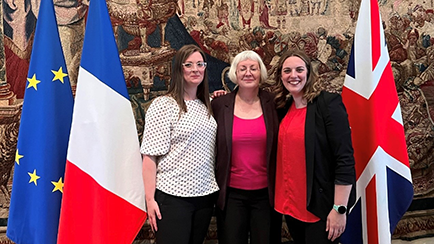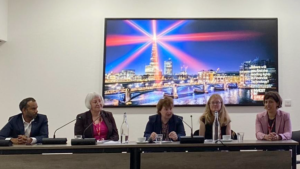Two ONR nuclear inspectors who took part in last year’s UK-France Women in Nuclear mentoring programme have described how the scheme has benefited them.
Last March three ONR employees were selected to take part in a mentoring scheme for women working in the British and French nuclear sectors. The scheme brought early- to mid-career mentees together with more experienced mentors from both sides of the Channel to support their career development and provide opportunities to meet other women in nuclear.
 ONR inspectors Laura Dixon, Denise Varley and Kate Hughes-Gill stand in front of EU, French and British flags at the French embassy
ONR inspectors Laura Dixon, Denise Varley and Kate Hughes-Gill stand in front of EU, French and British flags at the French embassyKate Hughes-Gill, a principal nuclear safety inspector within ONR’s Sellafield Decommissioning, Fuel and Waste division, became a mentee because she wanted to meet more women working in the nuclear sector at all levels and learn from their experiences.
Her mentor was a senior French nuclear researcher, and their connection gave Kate a valuable opportunity to learn from someone outside the regulatory sphere.
Kate said: “It was really useful to have my mentor’s support and a different perspective from the R&D side of nuclear.
“I also valued learning about what she achieved in her career and how she had helped forge a path for women like me.”
Denise Varley, a principal inspector in nuclear liabilities regulation, drew on over 30 years of experience to become a mentor for the scheme.
Denise said: “I wanted to give something back and work with women at earlier stages of their careers. I have benefited from working internationally in my role at ONR, including with colleagues in France, so I wanted to give others the same opportunity.
“I’ve also acted as a mentor before – in fact, I’m still in touch with a mentee I worked with over ten years ago.”
Denise’s mentee was a control instrumentation engineer working in a French company, and Denise felt they worked well together, adding: “This scheme was particularly good at engaging women from different backgrounds and encouraging co-operation and aspiration.
“I hope to continue mentoring in future, including after I retire in the next few years.”
As well as virtual meetings between mentees and mentors, participants in the scheme were invited to attend events in London and Paris. These allowed them to build connections with the wider cohort, including working together on presentations and going on site visits.
The two-day event in London featured a Q&A session with a panel of women in senior positions within the nuclear sector, on which Denise sat. The event also included a visit to the French embassy, where Dr Fiona Rayment OBE, Chief Science and Technology Officer at the National Nuclear Laboratory, was presented with the Légion d'honneur, the highest order of merit in France.
Denise said: “I was really encouraged and impressed by the enthusiasm of the mentees at the event. It felt empowering to be in a room full of women driven to progress in their careers.
“It was also exciting to attend Fiona Rayment’s ceremony of induction into the Légion d'honneur, particularly as Fiona is a great supporter of young women in nuclear.”
 Denise speaking in a Q&A session alongside panellists including Dr Fiona Rayment OBE.
Denise speaking in a Q&A session alongside panellists including Dr Fiona Rayment OBE.The international element of the scheme provided further learning opportunities for participants.
Kate said: “It was useful to discuss France’s nuclear sector in comparison to the UK’s – it gave me a wider understanding that I might not have gotten otherwise.
“It was also useful on a personal level to discuss working in a male-dominated industry, find commonalities in our experiences and learn how my mentor had overcome barriers she had encountered.”
Kate feels being a mentee with the scheme has had a meaningful impact on her career: “I met people I’d never have the chance to meet otherwise and hope to stay in contact with them going forward.
“It is invaluable to have that kind of support when you are in the earlier stages of your career.”
Kate found the support of her mentor particularly helpful when she was working towards a recent promotion, and also found the scheme useful in encouraging her to get more involved in promoting STEM careers and diversity more widely, including registering as a mentor herself to work with young women.
When asked what she would say to someone considering applying for the scheme, Kate said: “Go for it! There’s a whole network of strong female role models willing to share their experiences and offer support, so you need to take advantage of those opportunities.
“It’s also a great way to build up contacts in the sector, which is important both for developing your career and accessing day-to-day support from your peers.”
Denise expressed similar sentiments, adding: “Taking part in a scheme like this will broaden your horizons and give you the chance to meet different people, as well as increasing your confidence.
“It’s up to you what you get out of it, but I think the key points are to believe in yourself and find opportunities to plan and develop your career from the start.
“There’s a big wide nuclear world out there, and mentoring can play a key role in helping women in the nuclear sector reach their full potential.”
This year’s UK-France mentoring programme is open for applications until Monday 20 March. Visit the Women in Nuclear website to learn more and apply.